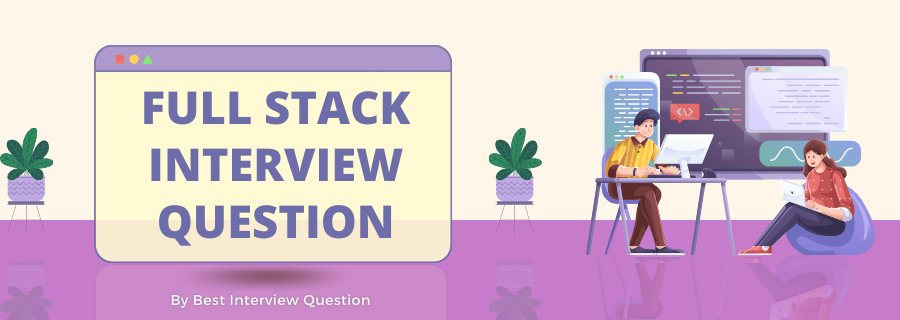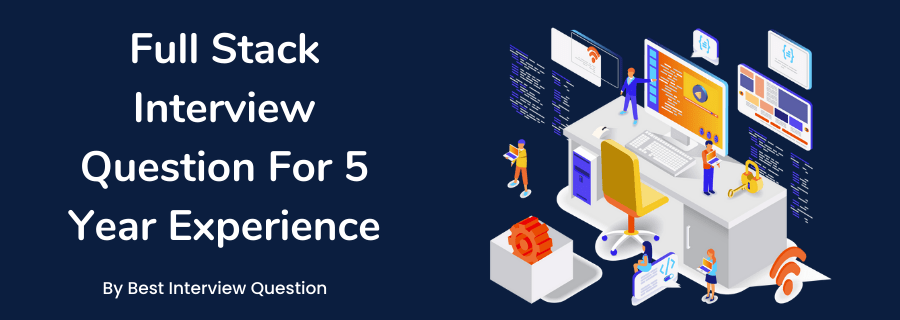Full stack interview questions and Answers

A Full Stack developer is expected to have the functional knowledge and the ability to work on all aspects involved in building an application. A Full Stack developer should be able to write front-end code in Java, HTML, and JavaScript; create APIs and write backend code in Python/Java and Ruby; work on hardware and OS; have knowledge of networking and security; understand design and query databases. Here is the list of Full Stack Developer Interview Questions that will help you to crack your interviews.
Most Frequently Asked Full stack interview questions
| S.no | LEFT JOIN | RIGHT JOIN |
|---|---|---|
| 1. | It gets the records from the rows of the LEFT side linked table and only the matching records from the RIGHT table. | It gets the records from the rows of the RIGHT side linked table and only the matching records from the LEFT table. |
1. Left Join
SELECT column_list FROM table_1 LEFT JOIN table_2 ON column_name1 = column_name2 WHERE join_condition
2. Right Join
SELECT column_list FROM table_1 RIGHT JOIN table_2 ON column_name1 = column_name2 WHERE join_condition
Normalization means merely a process of reducing or eliminating the data redundancy. As a result, space is saved, and the consistency of data is increased.
The denormalization is an optimization process to increase the data redundancy in the database. As a result, the joins are avoided, and the performance of the database structure is improved. Denormalization is done after the normalization process
Two-phase Commit (2PC) is the feature of transaction processing systems which enables databases that they return to the pre-transaction state if an error condition occurs. The two-phase commit strategy is designed to make sure that either all the databases are updated or none of them is updated. As a result, the databases remain synchronized.
| S.no | Horizontal scaling | Vertical scaling |
|---|---|---|
| 1. | More machines are added into your existing resources | More power i.e. CPU, RAM is attached to the current machine |
| 2. | Horizontal scaling there is no limit | Vertical scaling depends on the capacity of the machine |
| 3. | Licensing fees is more | Licensing fees is less |
| S.no | == | === |
|---|---|---|
| 1. | If the variables are not of the same types, then it converts one variable type to another and performs the operation | If the variables are not of the same type, then it will not achieve the process and will return false |
Note: The following Full Stack Developer interview questions are a guide to a basic understanding of the subject. Must read for Engineers switching to Full-Stack.
Event Bubbling and Event Capturing are the ways of the event propagation in the HTML API when an event occurs in an element which is located inside the other part and both the parts have registered a handle with the recently happened event. Here the event propagation mode identifies that in which order the elements receive the event.
In the case of Event Bubbling, the event is first captured and also handled by the innermost element, and then the event is propagated to the outermost element.
In the case of Event Capturing, the event is first captured and also handled by the outermost element, and then the event is propagated to the innermost element.
A Promise is an object which shows the result of the asynchronous operation. The result can be a resolved value or a reason why the process failed like “a network error occurred.
A promise can be any of the 3 states:-
- Pending - the promise’s result hasn’t yet been identified because the asynchronous operation has not been completed yet.
- Fulfilled - the asynchronous operation has completed, and the promise has now a resolved value.
- Rejected - the asynchronous operation has failed, and the promise has a reason that indicates why the process failed.
Prototypes are objects created in Javascript. They are the “parent” objects. If we want to create common tasks (properties/methods) for all the objects inherited from the parent object we need to define them in the prototype object.
A closure is the capability of an inner function to have access to variables in local scope in which internal function was created. Even if the out function has finished execution, closure means the inner function has access to its local variables.
Final classes cannot be subclassed; it is not open for change and can be used reliably for common execution of routines. “String” class in Java is an example of a final class. This is done for security and sometimes for efficiency.
Final methods cannot be overridden. They are not open to change. This prevents accidental changes which may result in crashing of application.
Java full stack developer interview questions
A java full stack developer is the person who is responsible for developing the frontend and the backend of the application. The term java full stack developer is used for the web developers who use Java for developing their entire technology stack.
- Import of project and the files
- Oops Concepts
- Core concepts
- Java array
- Collection Framework
- Debugging
There are a lot more skills that a java full stack developer requires, but the above ones are a must.

- What is a connection leak, and how can we fix it in Java?
- How can we detect and avoid deadlock in Java?
- What are the different methods of session management in Servlet?
- How many ways to handle exceptions in the Spring MVC Framework?
- Can you override a static method in Java?
- Which one is better, setter injection or constructor injection?
- What is the difference between Errors and Exceptions in Java?
- What is the difference between boxing and unboxing in Java?
- What is the use of overloading and overriding in Java?
- How garbage collection makes Java more memory efficient?
- What are Java's doGet () and doPost () methods?
Wrapping up
These are Java full stack developer interview questions that are going to help you in acing your upcoming interview. Prepare these questions very well and practice the coding part multiple times to ensure you didn't miss anything in your interview. If you have any suggestions about this article, please feel free to comment on the below box with your suggestions or feedback. If you want to learn more about the preparation for full stack developer interview questions, please visit our blog [blog link to be added].